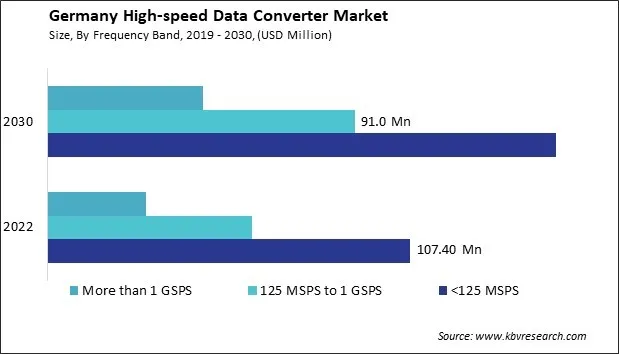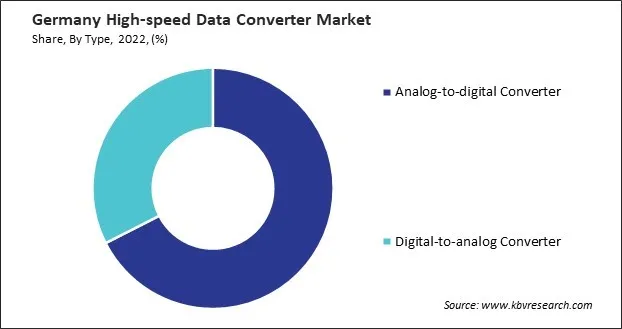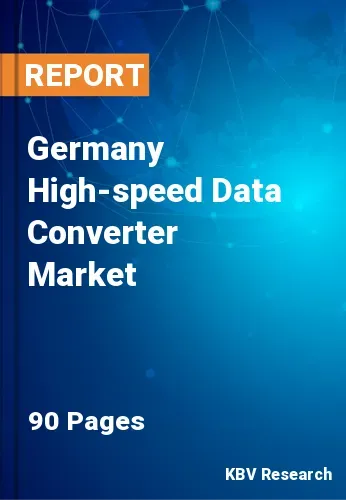The Germany High-speed Data Converter Market size is expected to reach $287.6 Million by 2030, rising at a market growth of 5.0% CAGR during the forecast period.
Germany's high-speed data converter market has been experiencing significant growth in recent years, driven by the increasing demand for high-performance data processing and communication systems across various industries. High-speed data converters are crucial in converting analog signals to digital and vice versa, enabling the seamless data flow in electronic devices.

Moreover, the industrial automation sector has been incorporating high-speed data converters to improve the precision and speed of control systems. This includes robotics, manufacturing processes, and smart factory applications, where real-time data conversion is essential for optimizing operations. The automotive sector, in particular, has witnessed a surge in adopting high-speed data converters for applications like advanced driver-assistance systems (ADAS), in-vehicle infotainment, and electric vehicle powertrains. The demand for high-speed data converters is further fueled by the growing trend of electric and autonomous vehicles, which rely heavily on data processing for safe and efficient operation.
The outbreak of the COVID-19 pandemic has had a positive impact on the high-speed data converter market in Germany. The increased adoption of remote working and online activities during lockdowns has driven the demand for high-speed data converters in communication infrastructure and data centers. The surge in e-commerce and digital services has also contributed to the growing need for efficient data processing.

The aerospace and defense industry has witnessed remarkable growth in Germany, propelling the demand for high-speed data converters. One of the primary drivers of growth in the aerospace and defense sector is Germany's commitment to modernizing its military capabilities. The need for advanced communication systems, radar technologies, and electronic warfare solutions has led to an increased demand for high-speed data converters. These components are integral for the swift and efficient processing of large volumes of data, ensuring real-time decision-making and enhancing the overall performance of defense systems.
Additionally, Germany's prominent position in the global aerospace industry has fueled the adoption of cutting-edge technologies. Next-generation aircraft and spacecraft development requires high-speed data converters to facilitate seamless communication and data transfer between various onboard systems. As a result, German aerospace companies are investing significantly in state-of-the-art data converter technologies to maintain a competitive edge in the international industry.
Furthermore, the country's focus on research and development, supported by government initiatives and collaborations with academia and industry, has contributed to technological advancements in high-speed data converters. This has led to the creation of innovative solutions that cater specifically to the demanding requirements of the aerospace and defense sector. Germany's commitment to sustainability and environmental considerations has also influenced the aerospace and defense industry. Integrating energy-efficient and compact high-speed data converters aligns with the country's goals of reducing carbon footprints and enhancing the overall efficiency of defense and aerospace systems.
According to the International Trade Administration, in 2019, the German aerospace industry experienced a notable uptick in revenues, reaching EUR 41 billion and reflecting a growth rate of 2.5% compared to the previous year's EUR 40 billion. This marked a substantial progression from the beginning of the decade when annual revenues stood just above EUR 25 billion. The industry's trajectory steadily climbed to EUR 40 billion in 2017 and reached a plateau of EUR 41 billion in 2018. Notably, Germany has the third-largest aerospace and defense industry, with revenues hitting EUR 39 billion in 2022.
This growth trend indicates the robust performance in the high-speed data converter market within the German aerospace and defense industry. Hence, Germany's robust commitment to modernizing its military capabilities, coupled with its leading position in the global aerospace industry, has propelled significant growth in the demand for high-speed data converters
The high-speed data converter market in Germany has experienced a significant transformation with the widespread adoption of wireless communications technologies. One of the key drivers for adopting wireless communications in Germany's high-speed data converter market is the relentless pursuit of faster and more reliable data transmission. The demand for high-speed data converters has surged across telecommunications, automotive, healthcare, and industrial automation sectors. In this context, wireless communication technologies enhance data transfer rates, reduce latency, and improve overall system performance.
In the industrial landscape, Germany's commitment to Industry 4.0 has further accelerated the adoption of wireless communication in high-speed data converters. Implementing wireless connectivity fosters agile and interconnected manufacturing processes, optimizing production efficiency and facilitating predictive maintenance.
Moreover, the healthcare sector in Germany has witnessed a paradigm shift with the adoption of high-speed data converters featuring wireless communication capabilities. This has enhanced the efficiency of medical devices, enabling real-time monitoring, remote diagnostics, and seamless integration with electronic health records. Thus, Germany's high-speed data converter market has undergone a significant transformation driven by the widespread adoption of wireless communication technologies.

Germany, a global powerhouse in engineering and technology, is home to several companies that are instrumental in shaping the high-speed data converter market. Infineon Technologies AG, headquartered in Germany, is a major contributor to the country's high-speed data converter market. Infineon's portfolio includes analog and mixed-signal solutions, including high-performance data converters. These components find applications in automotive systems, industrial automation, and communication infrastructure. Infineon's commitment to providing reliable and efficient data converter solutions positions the company as a key player in the German industry.
Rohde & Schwarz, a German company specializing in test and measurement equipment, contributes to the high-speed data converter market by providing advanced testing solutions. Their equipment ensures the precise characterization and validation of data converters, playing a vital role in maintaining these components' quality and performance standards. Rohde & Schwarz's expertise in electronic testing aligns with the rigorous requirements of the German manufacturing sector.
X-FAB Silicon Foundries SE, headquartered in Germany, is a key player in the semiconductor industry, offering specialized analog/mixed-signal foundry services. X-FAB provides solutions for developing and manufacturing high-speed data converters, enabling semiconductor companies to design and produce advanced analog components. The company's focus on analog/mixed-signal technologies supports the German semiconductor ecosystem.
Maxim Integrated, a global semiconductor company in Germany, has historically played a significant role in the high-speed data converter market. Maxim's analog and mixed-signal ICs, including data converters, are utilized in applications such as automotive electronics, industrial automation, and healthcare. The company's products emphasize power efficiency and integration, addressing the diverse needs of German industries.
Cypress Semiconductor, now part of Infineon Technologies, has been historically active in the German high-speed data converter market. Cypress brought expertise in programmable solutions and memory technologies, complementing Infineon's portfolio. The combined entity continues to contribute to the development of high-performance data converters. Collectively, these companies contribute to the vibrancy and innovation in the German high-speed data converter market. The collaborative efforts of these companies contribute to Germany's reputation as a leading hub for technological excellence in the global semiconductor industry.
By Frequency Band
By Type
By Application
Our team of dedicated experts can provide you with attractive expansion opportunities for your business.

